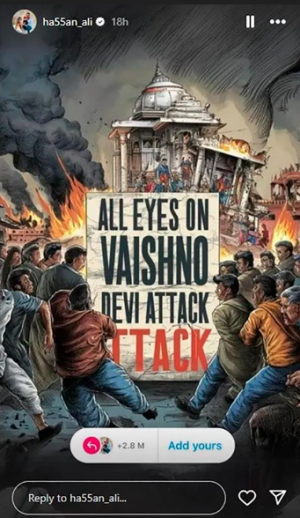- Joined
- Sep 11, 2023
- Runs
- 23,622
Pakistan cricket team pacer Hassan Ali has reacted on the attack with a post which has gone viral. "All eyes on Vaishno Devi attack," he posted on Instagram story. Ali's wife Samiya hails from India.
A deadly terror attack on a bus carrying pilgrims in Jammu and Kashmir's Reasi district has grabbed the world's attention. Nine people were killed and 41 injured as the terrorists opened fire at the 53-seater bus, which was on its way from the Shiv Khori temple to the Mata Vaishno Devi shrine in Katra, causing it to veer off the road and fall into a deep gorge near the Teryath village of the Poni area of Reasi on Sunday evening.

What are your thoughts on this?
A deadly terror attack on a bus carrying pilgrims in Jammu and Kashmir's Reasi district has grabbed the world's attention. Nine people were killed and 41 injured as the terrorists opened fire at the 53-seater bus, which was on its way from the Shiv Khori temple to the Mata Vaishno Devi shrine in Katra, causing it to veer off the road and fall into a deep gorge near the Teryath village of the Poni area of Reasi on Sunday evening.

What are your thoughts on this?










